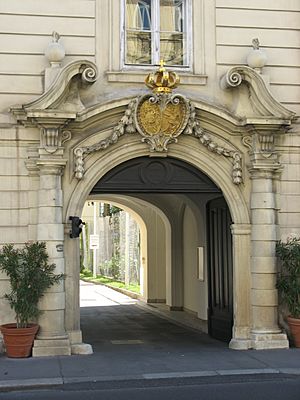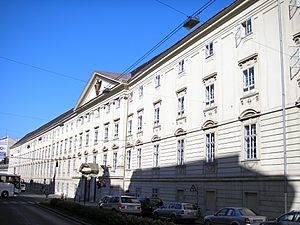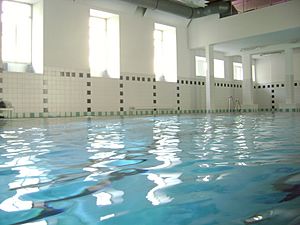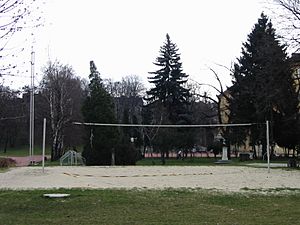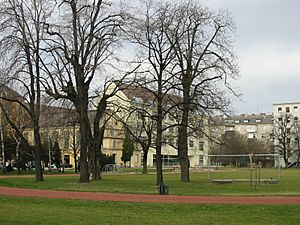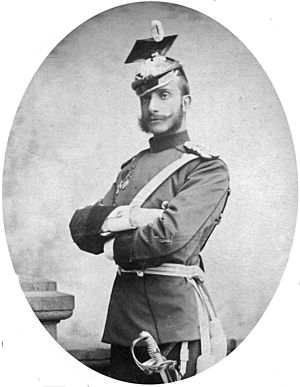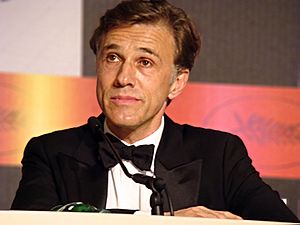Theresianum facts for kids
Quick facts for kids TheresianumGerman: Theresianische Akademie
|
|
|---|---|
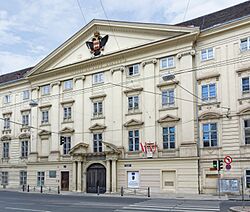 |
|
| Information | |
| Other name | Theresian Academy |
| Established | 1746 |
| Founder | Maria Theresa |
| Gender |
|
| Language | German |
The Theresianum (also called Theresian Academy; German: Theresianische Akademie) is a special private school in Vienna, Austria. It's both a boarding school (where students live) and a day school (where students go home after classes). Empress Maria Theresa of Austria started this school way back in 1746. It follows the rules for public schools in Austria.
Contents
History of Theresianum
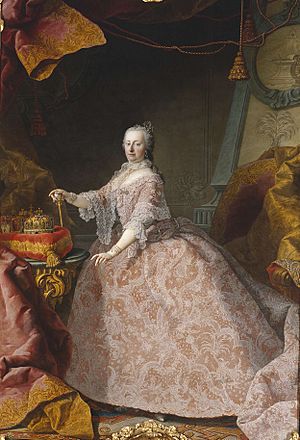
How it Began (1614–1746)
In 1614, the Habsburg family bought a farm near Vienna called Angerfeldhof. They fixed it up and called it Favorita. This became their summer home and a popular place for shows in the late 1600s.
In 1683, during the Battle of Vienna, the home was burned down. But a bigger and fancier Neue Favorita was built over the next few years. Three emperors of the Holy Roman Empire lived there: Leopold I, Joseph I, and Charles VI. When Charles VI died there in 1740, his daughter Maria Theresa decided not to go into the building again.
Founding and Changes (1746–1964)
In 1746, Empress Maria Theresa sold the palace to the Jesuits for 30,000 guilders. She wanted it to become a school that would train smart young men for government jobs. The new "imperial academy" was meant to pick the best students, have high teaching standards, and teach "modern" foreign languages.
In 1773, Maria Theresa's son Joseph II closed the Theresianum for a while. This happened after he ended the Jesuit religious order. More than 20 years later, in 1797, Francis II reopened the school. He put the Piarists in charge. He also finished the building's look that you see today and added things like a swimming school.
After the revolutions of 1848, Francis II's son, Franz Joseph I, decided to let sons of regular citizens attend. He also put the school under public rules.
In 1883, the Consular Academy moved into Neue Favorita. This was the world's oldest school for international relations. It stayed in a separate part of the building until 1905. Then it moved to a different building, which is now the U.S. embassy.
By the end of World War I, the school sold most of its properties. In 1938, after Austria joined Nazi Germany, Theresianum became a special school called a National Political Institute of Education. During World War II, the school was badly damaged. It could only reopen in 1957 after a lot of repair work.
Recent Times (1964–Present)
In 1964, the Diplomatic Academy reopened in Neue Favorita. It was a new version of the old Consular Academy. Famous people like former U.N. Secretary General and Austrian president Kurt Waldheim studied there. Many European ministers and government officials also graduated from it.
Theresianum started teaching both boys and girls in the late 1980s. The first female teachers began in 1988. The first female students were allowed to join one year later, in 1989. In 1993, the school got its first female headmistress.
Theresianum Today
International Focus
Before World War I, learning Hungarian was required. Students could also choose to learn English, French, Italian, Polish, Bohemian, Slovenian, Serbo-Croatian, and Romanian. Today, students must learn three spoken foreign languages: English and French, plus Latin.
Students can also choose to study Russian, Spanish, Italian, Portuguese, Hungarian, Polish, Japanese, and Chinese. Teachers who speak these languages help with these classes. The school offers language exchange trips for students in the 8th and 11th grades. They also have courses to help students get ready for language competitions.
International students aged 15 to 18 can study at Theresianum for three, five, or ten months. In 2009, students from 27 different countries attended the school. Theresianum also works with 18 partner schools around the world.
Extra Activities
Theresianum offers many extra activities that add to the regular schoolwork. These include special classes on public speaking and presentations, community service, and projects about culture and business. They also give career advice. The school takes part in Model European Parliament sessions every two years. These sessions help students prepare for leadership roles in the European Union.
By 1910, students could take many physical education classes. These included swimming, dancing, riding, and fencing. Today, Theresianum offers weekly sports classes in 15 different areas. They also have three special sports weeks for students in the 6th, 7th, and 9th grades. The school has its own ski club. Students can also learn to play 20 different musical instruments at the school.
Boarding School Life
Theresianum is both a primary school and a Gymnasium (which is like grades 5 through 12 in the U.S.). In 2010, 815 students were in 33 Gymnasium classes. This meant about 24.7 students per class. There were 130 teachers, so about 6.3 students per teacher.
To help students grow, Theresianum requires them to attend study sessions in the afternoons. These can be individual or group sessions with their teachers. School days usually end between 5:30 p.m. and 6:00 p.m., depending on the student's age. All students now have a 5-day school week. In 2007, 100 students also chose to live at the school full-time.
School Facilities
Theresianum has kept parts of its historic park in the center of Vienna. This park is about 50,000 square meters (about 12 acres). The school also owns properties outside the city. The sports facilities include an indoor swimming pool, two beach volleyball courts, tennis courts, soccer fields, basketball courts, and indoor gyms. All classrooms have modern digital media equipment. There are also laboratories for biology, physics, and chemistry classes. The school's old, beautiful rooms, like the library, can be used for special events.
Famous Alumni
Theresianum is known as one of Austria's best schools. For over 260 years, its graduates have made a big impact on Austrian and European history. These include Nobel Prize winners, political leaders, writers, and thinkers.
Some notable alumni include:
- Alfonso XII of Spain, who was the King of Spain.
- Max Perutz, who won the Nobel Prize for Chemistry.
- Christoph Waltz, an Austrian actor who won the Academy Award for Best Supporting Actor twice.
- Ernst H. Gombrich, an Austrian art historian.
- Joseph Schumpeter, an Austrian economist.
- Richard von Coudenhove-Kalergi, who started the International Paneuropean Union.
- Johannes Hahn, a European Commissioner.
See also
 In Spanish: Theresianum para niños
In Spanish: Theresianum para niños
- List of Jesuit sites


